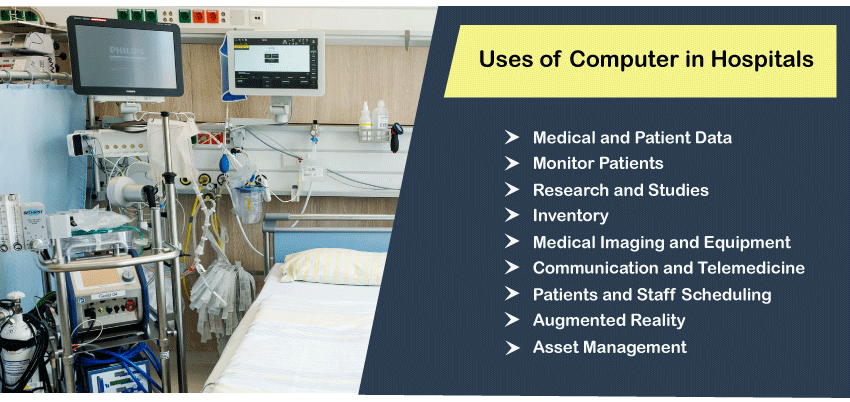Uses of computer in HospitalsNowadays, computers are used in various fields because of their characteristics and powerful functionalities. Computer plays an important role in various fields such as educational institutions, entertainment, homes, medical, businesses, government offices, research organizations, and many more. Computers play an important role in almost every field and making our day-to-day tasks more manageable. In previous times, computers were only used to perform complex numerical calculations, but they have reached too far and now perform many different roles. Now computers are performing diverse set functions from complex calculations to generating business reports, development to entertainment, programming, etc. In this article, we are discussing the common uses of computers in hospitals. In the below image, you can see the uses of a computer in hospitals. 
Computers in hospitalsComputers play a crucial role in the health and medical sectors. In health care, it enabled hospitals to maintain a record of their millions of patients in order to contact them for treatment or related to their appointment, medicine updates, or disease updates. In hospitals, computers are radically changing the diagnosis methods. In hospitals, computers are used for multiple tasks such as maintaining the information of patients, records, live monitoring of patients, X-rays, and many more. In hospitals, computers are also helpful to configure lab-tools, monitoring the blood pressure and heart rate, etc. Computers are advantageous as they enable doctors to exchange the data of patients easily with other medical specialists. Advanced surgical devices are based on robotics that helps surgeons to remotely conduct surgeries and complex operations. Let's discuss the common uses of computers in hospitals. 1. Medical and patient dataA computer keeps patient data organized, secure, and easily accessible. Traditional file systems are problematic. Medical staff requires fast access of patient records in emergency. In this situation, finding a patient's file in the cabinet wastes time. In busy shifts or in the hustle and bustle, the paper-based filing systems are completely disorganized. It sometimes causes the loss of patient's data. In a paper-based filing system, it can also be possible that the information of a patient can be going back to the wrong patient's file. So, using a computer, there are fewer chances of mismatching the data or data loss. 2. Monitor patientsComputers in hospitals are also used to monitor blood pressure, heart rate, and other critical medical equipment. The computer monitoring system also collects useful data from patients. This data can be accessed for future reference or can be further used for studies. 3. Research and studiesNow doctors can consult with medical databases to learn more about a particular disease. The presence of a computer in healthcare is enhancing the knowledge that can be accessed and used by the medical personnel. 4. InventoryFor a patient's treatment, it is important to know what medicines are in stock. It is crucial to keep an inventory list up to date because if the doctor prescribes a medicine and that medicine is out of stock so, it can cause a slowdown in the recovery. Meanwhile, inventory management is very important for health clinics and hospitals. So, computers enable the inventory managers to monitor the stock levels. 5. Computers for surgical proceduresComputers in operation theatres are helpful in saving lives. Surgeons depend upon computer systems for performing complex procedures. 6. Medical imaging and equipmentComputers are often used to control the medical equipment that performs important medical exams such as ultrasound, CT scan, MRIs, blood tests, etc. Additionally, doctors use computers to show their results and explain the condition and treatment. Computers also allow 3D drafting and imaging. 7. Communication and telemedicineSometimes the healthcare personnel is very busy, so using computers for communicating with others helps the personnel and makes their job simpler. Using a computer, Healthcare personnel can chat in real-time so that valuable information is transferred. It is better than getting messages or leaving post-it notes. Telemedicine is said to be the practice of caring for patients remotely when both patient and provider and not physically present. With computers and smartphones, doctors are now able to communicate with fellow medical professionals and patients. Telemedicine also plays an important role during natural disasters. Along with the above uses of computers in hospitals, there are some other uses that are listed as follows - 8. Mobile charting with medical-grade tablets 9. Improving patient's satisfaction and engagement 10. Asset management 11. Patients and staff scheduling 12. Augmented reality Medical computers are very advantageous in healthcare as they make the lives of medical staff more efficient. It also helps to recover patients safer. Medical computers also save money, in the long run, as they last longer than regular computers.
Next TopicWhat is a cloud platform
|
 For Videos Join Our Youtube Channel: Join Now
For Videos Join Our Youtube Channel: Join Now
Feedback
- Send your Feedback to [email protected]
Help Others, Please Share










